'Breaking down silos and ensuring a more integrated governance process is just as important to performance.'
'It has been a major priority in the last six years, especially in national security,' External Affairs Minister Dr Subrahmanyam Jaishankar points out when delivering the Sardar Patel Memorial Lecture-2020: India and the Post-Covid World.
The first of a multi-part feature.
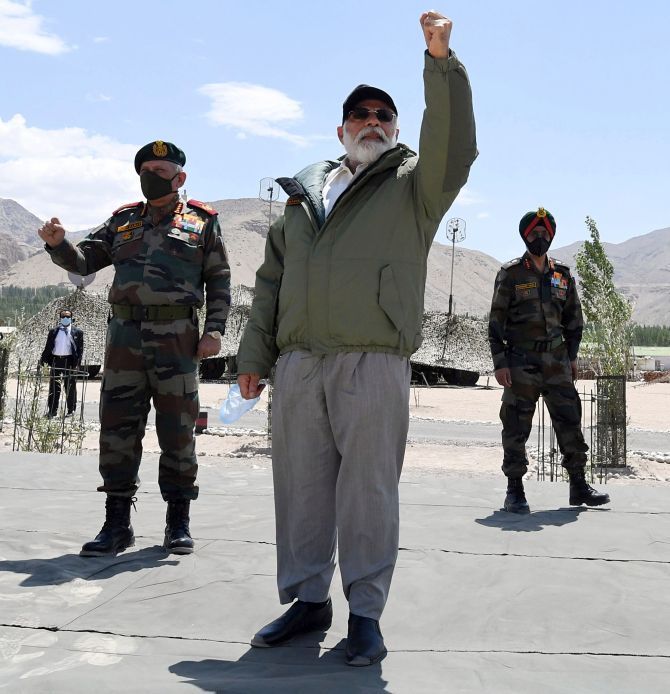
It is a great privilege to be invited to deliver the Sardar Patel Memorial Lecture this year. An important tradition, one that actually started the year I was born, these lectures have been delivered by a galaxy of eminent leaders, scientists, policy-makers and intellectuals.
I am very aware of the many footsteps that I am following today. That I represent Gujarat in the Rajya Sabha makes me even more conscious of this honour. And as someone seeking to connect my world of diplomacy, to Sardar Patel's record of taking on challenges of national development, I can think of no better subject than to focus on India's response to the world after the Novel Coronavirus.
This pandemic has been the most devastating global event in living memory for most of us. Its cumulative impact, in terms of lives and livelihood lost, is truly hard to quantify. Because we are more developed and inter-connected now, its implications for quality of life have been very profound.
In many ways, the upheaval can be comparable to the devastation caused by a major conflict. Yet, it is also very different in terms of its impact within societies and between nations. How it will change our lifestyle is still an unfolding experience.
What we can clearly see is that at the level of individuals, families, societies or even nations, many prospects have changed significantly. There are, of course, opportunities embedded in this crisis and their realisation will be one test of leadership.
At a collective level, we are still limited by our imagination to fully grasp the complications of an era we have now entered. And it is when contemplating these uncertainties that came upon us so suddenly, that the value of leadership in difficult circumstances is really recognised.
In the history of modern India, few symbolise that more appropriately than Sardar Vallabhbhai Patel.
Seventy-five years ago, both the world and India were in the midst of a different kind of turbulence, one no less in its seriousness. The Second World War had just ended, comprehensively overturning the global order. New centres of dominance emerged with very different interests and outlook. Forces set into motion, some predating the conflict, eventually ended colonial rule in vast parts of the globe.
At home, of course, the endurance and determination of our pioneering Independence struggle finally prevailed. But it did so at the cost of the Partition of our country, with all its accompanying consequences.
This was the context when Sardar Patel ascended the leadership stage and took on immediate challenges of nation building. He was already recognised as amongst our pre-eminent leaders, admired for his political vision as much as for his organisational skills.
On the assumption of power, he took on the most difficult responsibilities of governance, characteristically setting his personal interests aside. And it is this period of his national leadership that holds the most relevant lessons for us today.
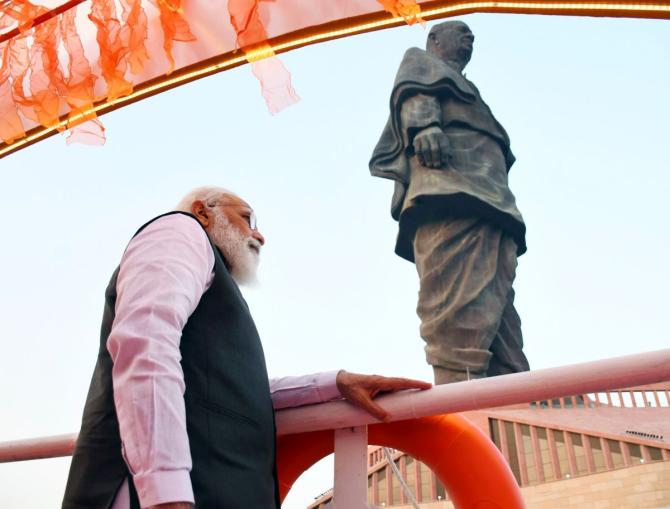
In the popular mind, Sardar Patel is seen as responsible for the accession of Jammu and Kashmir, Hyderabad and Junagadh. In reality, his contribution was even greater. In fact, these examples -- challenging as they were -- took place on a firm foundation that he had laid through a set of high-stakes and fast-paced negotiations with many other princely states. Because these events happened within India, we tend to think of them as politics rather than diplomacy.
But as V P Menon has so ably chronicled, the exercise involved the toughest negotiations we can imagine. And whether it is in their objective, strategy or tactics, they remain worthy of deep study even today.
Sardar Patel is also rightly associated with refashioning the civil services for independent India. He could do so because his administrative acumen commanded deep respect in both the state machinery that we inherited and the one that was then grafted on it.
At the same time, the Sardar remained very much a man of the people. His ability to harness the energies of the masses to the important issues of the day was legendary. His economic thinking has perhaps got less attention in history than it deserves. He clearly recognised the importance of rapidly building national capabilities by promoting greater entrepreneurship.
When it comes to national security, of course, he was undoubtedly the most hard-headed and practical. Distracted neither by political romanticism nor theoretical constructs, he saw the world for what it was, and strategised accordingly.
We also know that he was prescient about challenges beyond our borders. His famous exchange with Pandit Nehru in November 1950 set out their contrasting world views. As he helped steer India through challenges fundamental to our national consolidation, the Sardar set out some basic approaches that are relevant even today. These can serve as an inspiration when we address the issues arising from an extraordinary pandemic.
Even before COVID-19 engulfed the world, it was apparent that the international system we had got used to was under great stress. Its causes were multiple and complex, and they enhanced each other.
A set of issues centred around disenchantment with a globalisation that created unequal gains within societies and among them.
Looking back, it is evident that the economic interests of a few prevailed at the expense of the livelihood of many. The rationale of collective global advancement gradually lost credibility as a consequence.
The resulting class wars in the developed world contributed to growing political insecurity in many cases.
A second phenomenon, one more extended in its time frame, was the rebalancing of the global economy and thereafter, of world politics.
It was inevitable once independent nations emerged that there would be new centres of production and consumption. Its unfolding may have its own complexity that depended on national policy choices. But the larger trend was, in many ways, unstoppable.
After all, no era in history can be frozen to the perpetual advantage of the temporarily ascendant. Yet, when this happened, it unleashed a range of competitions and frictions that characterise current international affairs.
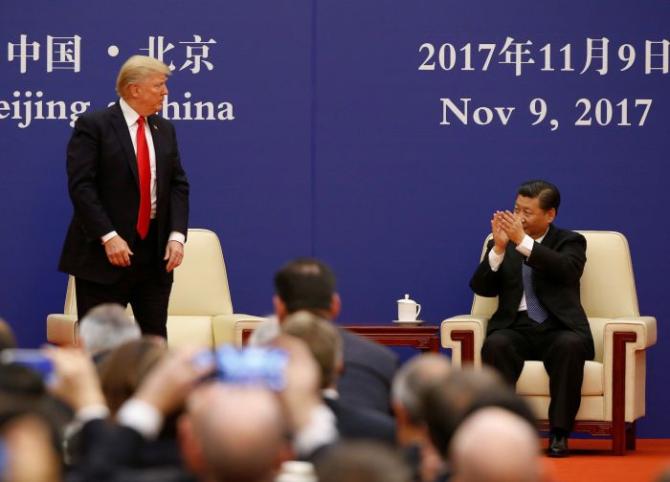
The combination of these two created a third set of challenges for the established global architecture -- a radical change in the weightage of world powers, along with an accompanying behavioural shift of dominant ones.
In particular, the rise of China and the repositioning of the United States have deep relevance. As interests and models became more difficult to reconcile, the resulting frictions brought into the open issues that were dormant till then in the international discourse.
To add to all these is a transformation of the metrics of power in an era of higher technology reliance and greater inter-dependence.
Political influence became less dependent on raw military strength and increasingly shifted to utilising instruments like finance, trade, connectivity, data and technology. The cumulative effect of these multiple happenings is visible today in more players, contested rules, conflicting agendas and sharper disputes.
The COVID-19 pandemic could well be the last straw on the back of a fraying global consensus.
If the world carried the burden of pre-existing conditions even as it was hit by the pandemic, India was no exception.
The conventional narrative in that regard tends to focus on issues of finance and trade, with some social and political problems added for good measure.
But a truly self-critical assessment of the last quarter century would raise deeper questions about our very understanding of reform and globalisation. It is often said that in India, we do the changes we must, rather than the changes we should.
In other words, we react to the crisis of the moment and slip back into a default position of complacency once that appears addressed. And the truth is that this is pretty much what has happened to us since the early 1990s.
Debates on reform have focussed largely around different aspects of the economy, industry and commerce, perhaps natural if we recall that the triggering crisis was a balance of payments one.
But the undeniable reality is that large swathes of economic, social and human activity were left untouched. Whether it was agriculture or labour, education or administration, the power of vested interests kept the impulses of further reform well at bay.
Our human development indices then naturally did not improve. And requirements of urbanisation remained as ineffectively addressed, as the demands of rural growth.
Not just that, the absence of progress across the social front began to tell increasingly even on the economic one.
This domestic scenario was mirrored by an external strategy that also limited India's competitiveness. In the pursuit of globalisation, we entered into arrangements with short-term calculations.
India imported to consume, trade, and profit rather than to absorb, innovate and produce. The over-leveraging of low cost options from outside obviously eroded domestic manufacturing.
Not coincidentally, despite fairly high economic growth, India's employment challenges also started worsening.
The consequences of this on sustaining demand and promoting production unfolded over time. Quite unconsciously, we began to perceive in the efficiencies of others a solution for our own limitations.
And with that, the cause of reform remained at a level that was comfortable for the order of the day. If self-assessments remained positive, it was because they were based on benchmarking ourselves against our own past, rather than vis-a-vis competitors.
That many others, including in our near proximity, had raced ahead always had explanations. By the second decade of this century, these realities have caught up with us. It has led to a growing realisation that globalization without a strategy is like driving without a destination. And the true yardstick for reform can only be its impact on comprehensive national power.
Policy-makers across the world dealing with the impact of the pandemic are now focussed on economic and social recovery. Nations have made decisions in line with their particular circumstances, many conscious that the real challenges still lie ahead.
Addressing both lives and livelihood has been an overarching concern for all. Expectedly, this is India's primary pre-occupation too at this time.
The pathway to recovery, however, also has steps of resilience that reflect the pandemic experience. These could be in terms of the more direct concerns, as in the health and pharmaceutical sectors.
Or they could be broader, covering domestic manufacturing, distribution and consumption. Perhaps more than we realise, rapidly creating a pandemic response infrastructure and meeting huge socio-economic needs during a crisis has created a new level of expectations.
If the Indian public has shown commendable fortitude and discipline in the face of adversity, it was in no small measure due to leadership and motivation.
Today, however, it is essential to think through strategies that would help put that behind us. But precisely because the pandemic has brought to fore many shortcomings, this is also an opportunity to contemplate deep reforms.
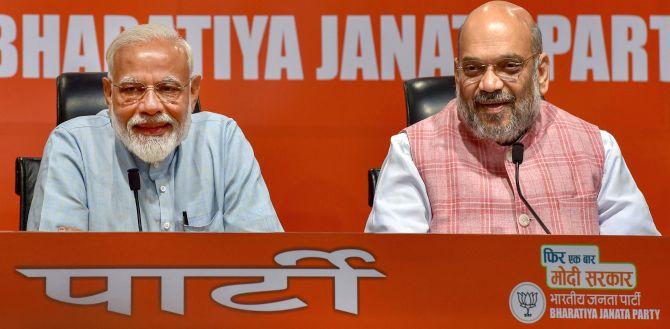
In a sense, a foundation for that has been laid by a set of initiatives since 2014. National campaigns addressed a wide range of challenges that were traditionally excluded from the debate on reform.
They ranged from financial inclusion to digital delivery, both on a mass scale; from power and water for all, to affordable housing; education and toilets for girls to sanitation and cleanliness; urban planning and rural incomes, to accelerating infrastructure building; from digitisation and formalization to skills development; as well as promoting start ups, entrepreneurship and innovation.
The message was of improving human development indices, making basic amenities available, leapfrogging using digital mediums, empowering the aspirational, and expanding opportunities and benefits while strengthening skills.
No less important was making change into the theme of a people's movement. By doing so, it finally put behind us the colonial mindset that the people and the government are two different entities.
This commitment to societal transformation was clearly appreciated by the public at large, as evident in the electoral outcome of 2019.
Today, these experiences have helped lay the groundwork for more sweeping changes that were long awaited.
The recent reforms in agriculture, labour and education are particularly notable, aimed as they are at freeing these sectors from the constraints of an era long gone by. Liberating the farmer from the middleman will obviously have profound implications for agriculture. Similarly, modern labour codes will expand employment and provide for wider benefits.
Educational changes have not only introduced more flexibility but made us more employment friendly. Indeed, when set against the backdrop of massive social welfare programmes and digitally-assisted delivery, it tells us how much more reformist a human-centric approach to governance can be.
Policy reforms, however, require practical support, and that too has been forthcoming in different ways. Manufacturing generally and MSMEs are getting the attention and support now that they have long deserved.
More than the sectors themselves, India appears to be freeing itself from the economic outlook of the period that followed the demise of the Sardar.
There are other areas as well where the winds of change are blowing, not least in the entrenched domains of administration and civil service. It is clear by now that Sardar Patel's vision of creating the best policy outcomes needs refreshing.
A renewed stress on specialisation, performance and delivery is, therefore, particularly welcome.
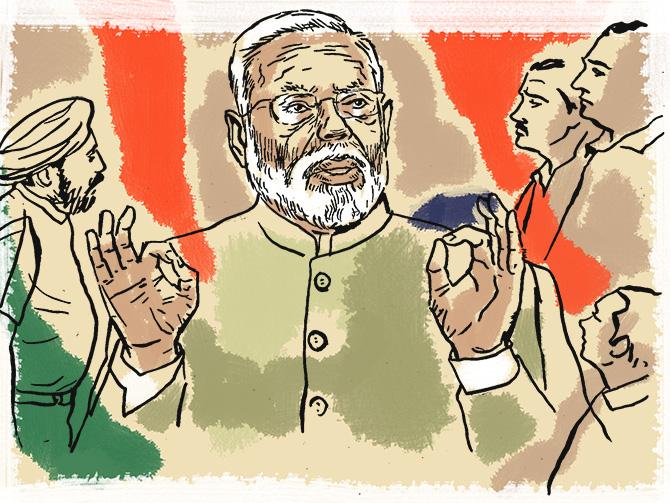
We must have no illusions that the road to recovery and beyond will be a long and arduous one.
Looking at the horizon, there are lessons from experiences of others that India needs to imbibe, whether in terms of human resources, social infrastructure or economic capabilities.
Basic amenities of power, water and housing can no longer be treated as a luxury. Nor can education, healthcare, skills and employment remain just options for some.
In particular, a greater focus on technology and manufacturing is central to India's prospects. Digitisation could well hold the key to the credible emergence of social welfare in a nation with limited resources. This is important to recognize given the growing expectations of aspirational thinking.
A commitment to promoting more employment-centric growth may be assisted by labour reforms and skilling programmes. But, it also sees a strong and sustained effort towards making it easier to do business.
Paradoxically, it has to overcome an earlier encumbering of the economy in the name of being pro-poor, when the reality was that it shrank employment opportunities.
Some of the answers also lie in the purview of our trade policies that have not done our interests adequate justice.
Let us not forget that in a world where trade wars and technology battles are likely to be more commonplace, de-industrialisation is truly akin to unilateral disarmament. But making it easier to do business is not just an economic objective; it has enormous social and even strategic implications.
In the final analysis, it is central to the rapid strengthening of India's comprehensive national power. And where reform itself is concerned, India would truly arrive when we internalise that this is an endless process with ever-widening application.
Serious powers know that this journey really does not have a destination.
Challenges for national growth and development are not limited to the socio-economic domains. Addressing governance deficits and implementation shortcomings are a major part of the solution.
The problem, of course, comes in many forms and variations. They range from outdated policies and inadequate frameworks to casual implementation or even downright neglect.
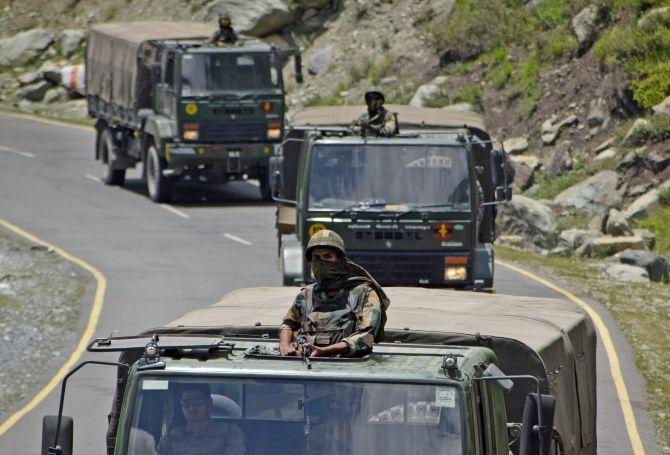
At the end of the day, it is as much about capabilities as it is about strategising. If we bemoan the limitations of border infrastructure today, we must ask ourselves the reasons for their current state.
After all, the periphery will reflect in large measure the capabilities, or their lack, in the heartland. Leaving parts of the country under-developed or under-governed has its obvious risks, more so at the border.
It also cannot be that we rise to special challenges, while neglecting the daily routine. Safeguarding borders, for example, is a 24x7 exercise, not only an appropriate response to an emerging situation.
Our own debates in regard to national security need to recognise this value of putting in place the requisite structures and systems. Advocating sweeping solutions without laying the groundwork may be dramatic politics; it is not serious policy.
On the contrary, our experience in the last few years in expediting the creation of border infrastructure in the North shows how much difference sharper focus and better implementation can make.
Breaking down silos and ensuring a more integrated governance process is just as important to performance. It has been a major priority in the last six years, especially in national security.
This shift from declarations to delivery is very much in keeping with the outlook of the Sardar. Underlying it is, of course, a basic willingness to fully recognise the challenges that the nation faces.
By playing down issues like cross-border terrorism or competitive geopolitics, there has been a tendency to look away from the hard choices.
In a more difficult world, that is going to be less possible.












 © 2025
© 2025